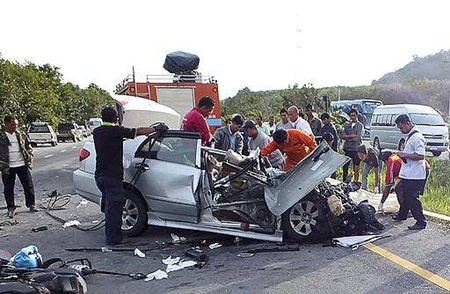The Ministry of Transport has set a target to lower traffic-related mortality rate by 50 percent in the next seven years.
According to Deputy Permanent Secretary Theerapong Rodprasert, about 14,000 people were killed in road accidents in 2012, or around 38 people a day. One-third of the number was breadwinners prompting their families to face financial difficulties.
Those accidents have disabled around 5,000 – 6,000 people a year which can be translated into an economic loss of 230 billion baht annually, or 2.8 percent of Thailand’s GDP.
 Another road accident.
Another road accident.
The ministry aims to reduce the number of accident-related deaths to 7,000 in 2020 by working closely with other ministries and bodies such as the Interior Ministry, local and provincial administrations, to monitor and prevent road accidents, under the ten-year master plan on road safety started two years ago.
On December 11-12, the ministry also held the 11th national seminar on road safety to encourage every party involved to speed up their works on how to lower the number of road accidents and increase awareness among road users
That was derived from a press release from the Ministry of Transport, but it must be examined in a little more depth than has been the case. Firstly, the death toll is far higher than the “official” figures. Secondly, to be classified as a statistic in the road toll, you actually have to be killed outright on the spot. Those who die later in hospital are not included! (In the west, any deaths within 30 days of hospitalization are counted in the road toll.)
According to the WHO, Thailand has the 6th worst road toll per capita in the world at 42.9 deaths per 100,000 population. Only countries worse are Namibia (53), Swaziland (48), Malawi (45), Iraq (44), Iran (43). Even Zambia and Uganda are better than Thailand.
Now to break down our deaths – between 75-80 percent of them involve motorbikes. The vast majority of these deaths have no crash helmet having been worn.
It isn’t rocket science to see that if the compulsory helmet laws were rigidly enforced, and the helmets were of an international standard, you would see a dramatic decrease in our road toll. And that doesn’t need committees, sub-committees and seminars. The answer is staring the Transport Ministry in the face!
But will they do anything? We both know the answer!




